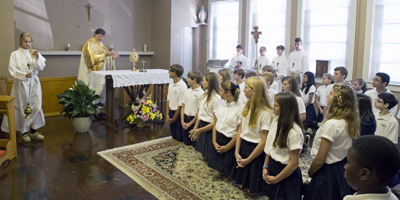
On one point, I think most of us, especially Christians, can agree: Violence is bad. And yet we often don’t recognize violence in all its forms. Apart from our common understanding, violence is also defined as: “strength of emotion or an unpleasant or destructive force.” In a broad sense, violence could include emotional manipulation, yelling, bullying, gossip, rudeness, and isolation.
Taking into account this broader understanding, violence is more common than we realize. Violence is any behavior, words, or actions wounding the dignity of another.
Emotional abuse is a form of violence, creating wounds often overlooked and particularly difficult to heal.
Another way we commit violence is by failing to listen to others or by patronizing and belittling those who think differently from ourselves. Winning an argument becomes more important than respectful dialogue. We diminish people we disagree with by labeling them as “nuts,” “losers,” and other derogatory terms.
We see much of this violence in our public discourse, particularly during this election cycle. And the internet, television, and radio talk shows are popular places for bullying and derision.
We adults claim to be concerned about bullying in the schools, yet outside the schoolyard, bullying is alive and well, often appearing in social media, on television screens, and in our conversations. The rhetoric we tolerate, indeed the rhetoric we sometimes approve, sets a terrible example to the young.
One of the most distressing parts of adolescence is the establishment of cliques, those groups of teens forming a tight circle and refusing to allow entry to those of whom they disapprove for reasons the clique has concocted. We often think that once we reach adulthood we have outgrown either the desire to form a clique or the pain of being excluded.
Yet if we look closely at the way we live, we may discover that we’ve retained many of the qualities of that painful experience. Either we exclude others, or we ourselves are excluded.
Even as adults, too often, we choose people like ourselves for friendship and social interaction. We have little need, much less desire, to interact with people whose lives are dramatically different from ours. Indeed, entire communities are built around the concept of exclusion with gates and guards monitoring entry.
Thus, as a result of this exclusion, we are prone to embrace stereotypes and become easily manipulated into believing that the other is a threat, not a friend.
We see this mentality manifested recently in our distrust of refugees, Latino immigrants, blacks, Muslims, and those whose sexual orientation is different from our own. We see them as threats because we don’t know them, and we seldom try to know them.
It is much easier to focus on perceived threats than to wrestle with the darkness in ourselves that prompts us to be so fearful.
As Christians, we are called to be light to the world. We must begin by allowing Christ’s light into our own lives to expose the darkness in our hearts. Once we are willing to acknowledge our own darkness, we are less likely to project that darkness on others. Then, recognizing we are called to offer light to all God’s people, not just those who are most like us, we can turn away from all violence and promote reconciliation and peace.


